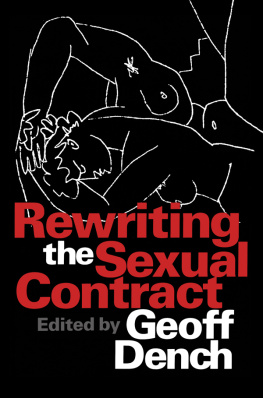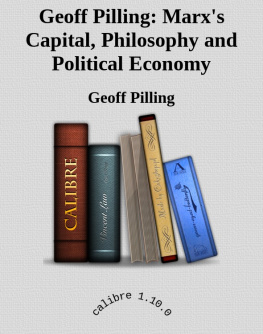Rewriting the Sexual Contract
Originally published in 1997 by the Institute of Community Studies, London.
Published 1999 by Transaction Publishers
Published 2017 by Routledge
2 Park Square, Milton Park, Abingdon, Oxon 0X14 4RN
711 Third Avenue, New York, NY 10017, USA
Routledge is an imprint of the Taylor & Francis Group, an informa business
Copyright 1999 Taylor & Francis.
All rights reserved. No part of this book may be reprinted or reproduced or utilised in any form or by any electronic, mechanical, or other means, now known or hereafter invented, including photocopying and recording, or in any information storage or retrieval system, without permission in writing from the publishers.
Notice:
Product or corporate names may be trademarks or registered trademarks, and are used only for identification and explanation without intent to infringe.
Library of Congress Catalog Number: 98-28945
Library of Congress Cataloging-in-Publication Data
Rewriting the sexual contract / edited by Geoff Dench.
p. cm.
Originally Published: London : Institute of Community Studies, 1997.
Includes bibliographical references and index.
ISBN 0-7658-0466-2 (alk. paper)
1. MenPsychology. 2. MenAttitudes. 3. Sex role. 4. Man woman relationships. 5. Feminist theory. I. Dench, Geoff.
HQ1090.R46 1998
305.3dc21
98-28945
CIP
ISBN 13: 978-0-7658-0466-2 (pbk)
Acknowledgements
This book would not have appeared without the support of the Joseph Rowntree Foundation, which both funded the original research that fed my interest in the issues explored here and has helped to support the production of this subsequent collection. Special thanks are due to Barbara Ballard for her patience and encouragement.
Colleagues at the Institute have given me a lot of back-up during the preparations for publication. Kate Gavron in particular has been typically generous with a whole range of editing and sub-editing advice and assistance.
Finally, though it may not be the usual thing to do, I would like to thank the contributors to this volume. They have submitted themselves to a very tight schedule, and put up with a good deal of harassment from me. In addition to delivering their own pieces, mostly on time, they have done more than they probably appreciate, through their conversations with me, to help develop the overall form and compass of the book. They have made it possible for a rather vague initial concept to take eventual shape.
Geoff Dench
In a world changing rapidly on almost every front, nothing appears to have been transformed more fundamentally or decisively than our ideas about how men and women should be expected to relate to each other - whether personally, within families, or in the public sphere. Only one generation ago it was still taken for granted by most people, and by state policy, that men and women were inherently different and needed each others distinctive mutual support. Both the durability of their desire for each other and the wider social order were seen as underpinned by this interdependence. Many people no longer feel this, and social policies have ceased to rely on it. There is instead a widespread assumption that social progress has rendered superfluous all of the social imperatives and conventions which previously constrained gender roles and sexual relations. Complementarity has been replaced by an assumption of personal autonomy and interchangeability. Each of us feels that we can be what we like, and construct our own biographies. If we want to have a new sort of template for society, in which gender does not have to entail what it used to, or indeed to mean anything at all, then that is what we can now choose.
Maybe we can, and will. But I suspect that this libertarian prognosis does go rather against the grain of most peoples everyday practical experience. Behind the modem rhetoric of personal independence, old ideas about the importance of sexual differences and divisions of labour in the constitution of society may survive largely unaltered for many people. Popular book sales are perhaps a better index than articles in cutting-edge journals of what people really think. We should not forget that Barbara Cartland continues to set new records with the sales of her resolutely romantic novels. Old ways may also be resurfacing in new guises. In the US, which is usually five to ten years ahead of us in testing new lifestyle cultures, the best-seller lists over the last few years have contained a stream of books spelling out the rules of how to catch your man and, having done so, how to understand and hold on to him. Although often dressed up in neologisms and phrased as psychoanalytic revelations, these manuals are devoted to discovering and celebrating notions of sexual difference and interdependence which our grandparents would have regarded as commonplace.
There have been similar shifts lately in Britain, including I think some revival of tolerance towards men in writing on gender issues. For some years until quite recently men were subject to regular doses of advice from commentators, such as Harriet Harman (1993 and Patricia Hewitt (1993), telling us sternly that we had failed to earn our passage to the future, and so were being left behind by women. Now books are emerging from the same intellectual stable, by Adrienne Burgess and others (1996: 1997), which although ostensibly still urging that men need to progress, are much more likely to present the journey as a joint adventure for men and women. Even more significantly perhaps, not far below the surface they also betray a discernible hankering after the comfortable virtues of the traditional family man. Alongside this a whole new genre of books by feminists rediscovering motherhood has evolved.
Some of this may represent only passing fads or flutters of lifestyle nostalgia. It is too early to say. But it does indicate that we should not assert too confidently that conventional prescriptions for relations between men and women have been tom up and thrown away for ever. Scepticism is permitted again. It has become possible to ask whether the drive towards strict gender symmetry is actually producing the benefits for women and society which it has promised, without being dismissed out of hand as a misogynist or carpet-bombed with accusations of being afraid of feminism.
Assessing the evidence for change
The accumulating evidence from social research, although tangled and notoriously difficult to interpret, does I believe reinforce the case for caution. The immediate impetus for this book derives from a small study of my own into the changing position of men in British family life (1996b). This investigation turned up a number of findings of a very paradoxical nature, which seem to conflict with the conclusions of much other current research in Britain, and raise serious questions about how research findings are best interpreted. Although its conclusions are necessarily tentative, given the small scale of the study, they are potentially very significant and impressed on me the need for some wider discussion of how to arrive at better understandings of what is currently going on in domestic relations.
My findings highlighted in particular the importance of examining very closely the nature of the link between what people say and what they do. Thus they confirmed, in line with many current attitude surveys, that a substantial minority of all men, and a majority of younger men, offer verbal support for more egalitarian gender roles. What they also showed, paradoxically, is that those men who do actually share domestic work with partners may in fact be more inclined towards










